Bienvenidos
En este blog encontrarán información importante: generalidades de la materia, hoja de ruta, material adicional, trabajos prácticos, links, etc. que utilizaremos en Inglés I y II.
En caso de no poder asistir a alguna de nuestras clases, lo publicaré por este medio.
Espero que lo encuentren de utilidad.
Muchísimas gracias.
Carolina
lunes, 1 de agosto de 2016
domingo, 17 de julio de 2016
Apps_ Dictionaries and Vocabulary Tools
Dictionaries & Vocabulary Tools
Sometimes a word is on the tip of your tongue, and you just can’t get it out. Mobile dictionary apps, word lists, and vocabulary practice tools are a great way not only to learn new words, but to figure out how to explain what you’re trying to say in multiple ways, when that one crucial word just slips your mind.-
Simplex Spelling Phonics 1 – English

This simple spelling and phonics tool can increase the language skills of children or beginners in English. It is easy to use and goes past simple memorization to teach the actual rules of language.
Download Here — iTunes -
The Free Dictionary

This dictionary app is a comprehensive dictionary of English, Spanish, French, and 11 other languages. It also offers a translation option.
Download Here — Google Play -
Dictionary.com w/ English Learner’s Dictionary

The official Dictionary.com app offers great features including idioms and phrases, history of words, and spelling suggestions. These features are all important for English learners.
Download Here — Google Play -
Merriam Webster Learner’s Dictionary

Merriam Webster is one of the most well-known creators of English dictionaries. This learner’s dictionary offers full, clear definitions and numerous usage examples for languages learners.
Download Here — iTunes -
Learn English 6000 Words

This language learning app plays like a game. Users learn over 6000 vocabulary words with illustrations, phonetic transcriptions and pronunciation recordings.
Download Here — Google Play -
Offline English Dictionary

This Blackberry dictionary app gives 130.000 words and definitions. It has several distinct features, such as a saved word list from previous searches, and can be used offline.
Download Here — Xapps -
Comparative Adjectives

Kids can begin to understand comparison and adjectives as they learn English with this Comparative Adjectives app. Description and understanding characteristics are at the core of any language, and this app helps kids grasp that basic skill early on through images and examples.
Download Here — iTunes -
Spell & Listen cards – the talking flashcards for spelling

This app is designed for kids 3 – 10. Photo flashcard word puzzles challenge kids to learn spelling and reading, and are organized in increasing order of difficulty so that once they master certain words, they can continue to grow their vocabulary.
Download Here — iTunes -
Chambers Dictionary

This English dictionary provides anyone with English language questions with answers and definitions. Definitions from every category are included, including science, technology and contemporary culture.
Download Here — iTunes -
LEO Dictionaries

This Windows Phone app is an English dictionary, offering the same content that is available from the online LEO dictionary. Users can access definitions for unknown words and increase their vocabulary.
Download Here — LEO.org -
WordWeb Dictionary

This English dictionary and thesaurus is great for English language learners. Some of its features include not only fast searches and word definitions, but sounds-like and often-confused with words, as well as usage examples.
Download Here — iTunes -
Snapanda-English-Dictionary

A dictionary built for the mobile device, SnaPanda makes use of the camera feature to identify and look up words in English.
Download Here — iTunes -
WordBook(universal) – English Dictionary and Thesaurus

WordBook(Universal) – English Dictionary and Thesaurus is displays impressive prowess when it comes to its capabilities and the built-in spell checker makes it much easier to catch mistakes. The app has over 120,000 pronunciation guides and 70,000 usage samples as well.
Download Here — iTunes -
Vocopedia lite

This app helps build a person’s English vocabulary through synonyms and examples. It’s a great prep tool for exams like the GRE, SAT, TOEFL and CAT.
Download Here — Google Play -
Longman Dictionary

Longman Dictionary is an innovative tool for keeping one of the best dictionaries at your fingertips with this app. There are a range of different add-ons contained within the app, including phrasal verbs, English-Japanese Dictionary, key words, and more.
Download Here — Pearson -
Macmillan Dictionary

Macmillian Dictionary is heralded for their English pronunciation aid and unique ability to help students and teachers. By taking an approach based on Adrian Underhill’s Sound Foundations, they’ve been able to craft an app that is easy to use and engaging.
Download Here — SoundsPronApp -
Advanced English Dictionary

Advanced English Dictionary has tallied over a million downloads and is one of the most comprehensive apps for the English language. The app has over 400,000 entries, so users can depend on its assured quality.
Download Here — Windows Phone -
15500 Useful English Phrases

This app helps those learning English take their knowledge to the next level by offering the most important phrases to know to help communicate effectively. These include idioms, public speaking phrases, business phrases, and things to say in conversation.
Download Here — iTunes -
iLearning – Vocabulary Trainer

iLearning is an efficient vocabulary trainer for school, education and personal purposes. All learning units are displayed on the app, showing the last rate of the correct answers, the lowest and highest learning level reached so far using colors, and the remaining time in days until vocabularies should be recalled.
Download Here — iTunes -
Advanced English Dictionary & Thesaurus

With Advanced English Dictionary & Thesaurus, nouns, verbs, adjectives and adverbs are grouped into sets of cognitive synonyms, interlinked by means of conceptual-semantic and lexical relations. In addition to the straightforward definition, the dictionary shows how each word is linked to other words in terms of synonyms, opposites and similar words, but also hyponyms and hyperlinks within the group. The resulting network of meaningfully related words and concepts helps you to better understand the word meanings, facilitates the quick finding of the correct meaning and allows you to quickly memorize words.
Download Here — iTunes
Top 10 Apps for Learning English
Top 10 Apps for Learning English
iPads or tablet PCs are the most wonderful tools for learning and teaching English. Students are more attracted towards iPads as compared to other devices, and use them to access online resources in their classrooms. With the help of the thousands of education and language apps available in Apple’s app store, students make effective use of the iPad to learn in an interactive environment. Given below is a list of some of the best iPad apps for learning and teaching English.1. Grammar Up
Grammar is the heart of any language and, thus, the Grammar Up app is one of the most highly recommended apps for English learners. This app is specifically designed for people who want to improve their grammar, vocabulary and word selection. It consists of more than 1800 multiple-choice questions grouped under twenty different grammar categories.
2. English LaunchPad
The English LaunchPad is an app especially designed for English learners and teachers. This app offers a complete package that is full of useful information to help boost your English learning experience. The common features of the English LaunchPad app include practice exercises, lesson plans, grammar structures, whiteboard, quiz generator, student tracking, student roaster, translator and flash cards.
3. Socrative
If you want a great tool for creating instant formative and summative assessments, then Socrative is the app for you! Socrative is a cloud-based app by which teachers can easily create a variety of polls, quizzes and various other practice exercises for students, while monitoring and keeping a check on the students’ response.
4. Learn English The Fun Way
“Learn English the fun way” is an amazing app for grammar and matching lessons in which English learners get to do simple exercises such as matching an animal or a short description of something to its picture.
5. SpeakingPal
Recommended as one of the best apps for English educators and learners, SpeakingPal allow users to record and compare their speech with a native English speaker. This amazing app combines video with automatic speech recognition software that tests your English speaking skills. You just have to speak with a video character and get immediate response on how well you said and pronounced all your English words. In short, this app basically understands and rates your speech.
6. Grammaropolis
The Grammaropolis app can be called the school of grammar. It shows the parts of speech in the form of animated characters that have different personalities based on their respective roles in a particular sentence. This app makes learning grammar more fun and exciting.
7. iFPoems
iFPoems is a fantastic app for poetry lovers. This app consists of a great collection of poems from famous poets around the world. It also allows users to save their favorites along with recoding their own readings of the poems.
8. Wordflex Touch Dictionary
Turn your word-meanings search into a fun experience with the Wordflex Touch Dictionary app! Developed exclusively for iPad in association with the Oxford University Press, the Wordflex Touch Dictionary app converts your word entries into attractive trees which you can move, drag, share and reorganize using touch gestures. This app is among the best as it also contains audio pronunciations both in UK and US English, which is a great benefit for English learners.
9. Dynamic English Lesson 3 – Idioms
The Dynamic English Lessons 3 – Idioms is an app that helps students learn and remember idioms using interactive games, fun graphics and practical examples. The idioms are grouped under six different categories including animals, body parts, objects, action and sports, food and drink and miscellaneous. By using the dial, you just have to select the right words in order to complete the idiom that is shown in the picture. It is one of the best apps if you want to test yourself on how to use idioms correctly.
10. iBooks
iBooks is a complete book library for the iPad users. It includes the iBookstore and allows users to download and read books for free. It also allows users to save their favorite classics for free. The app features a beautiful bookshelf, on which you can browse various books; tap a book to open and read it, and add notes to your favorite paragraphs in the book. You can also create your own texts and upload them into the app.
Apps apprender palabras de una forma divertida
Memrise
Website: http://www.memrise.com/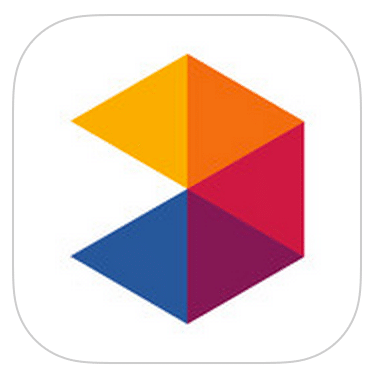
iOS /Android
Price: Free
Description
Memrise is a bit similar to MindSnacks – the focus of this app for learning English is English words.
But, unlike MindSnacks, Memrise doesn’t help you learn through games.
Instead, it uses some creative, funny ways to help you remember what words mean.
And if something’s funny, you can probably remember it better.
Interestingly, Memrise courses are designed by users. So you can see how other English learners learnt these same words you’re learning.
There are over thirteen pages of courses available on the app, from easy ones like “English Irregular Verbs” to more difficult ones like “A Tale of Two Cities” by Charles Dickens.
Many English learners find learning new words to be one of the most difficult things about the language. American English uses a large vocabulary set in particular.
With Memrise, you have a fun and easy way to remember words that seem foreign to you.
Also, you can also keep track of what you’ve learnt. This way, if you forget what a word means, or forget what words you’ve learnt, you can just go back and have a look.
A very effective (and funny!) way of learning English words, I recommend this for anyone, whether you’re a beginner or an advanced English learner, who want to expand their vocabulary.
Apps para aprender idiomas
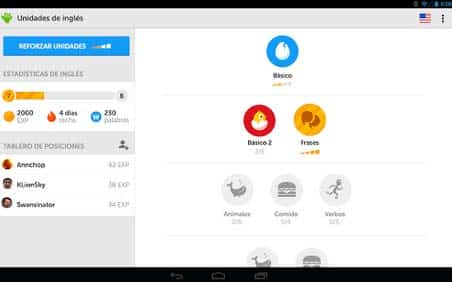 Duolingo
DuolingoUna de las alternativas más populares para aprender idiomas (inglés, francés o portugués), es gratuita y no tiene publicidad. En ella se va trabajando por unidades a modo de juegos: por ejemplo, pierdes vidas con las respuestas incorrectas, y ganas puntos y subes de nivel cuando aciertas.
Apps para mejorar la gramática
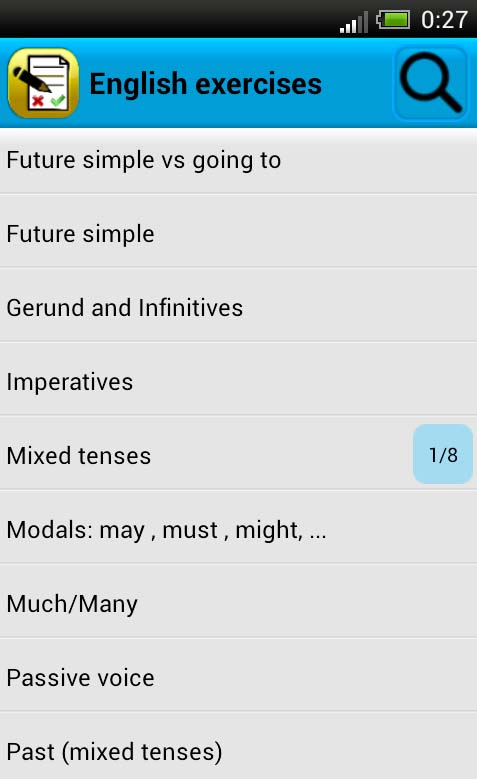 Ejercicios de inglés
Ejercicios de inglésCompatible con Android, tiene gran variedad de ejercicios para trabajar pronombres, artículos, condicionales, tiempos verbales… Vienen con solución, para que sepas si lo haces correctamente. Es gratuita.
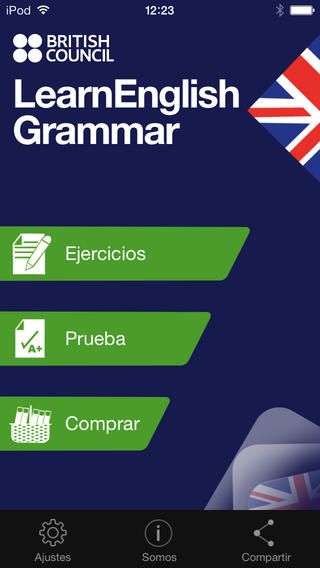
LearnEnglish Grammar
Gratuita (aunque con paquetes de descarga de pago) y compatible con Android e iOS, ha sido pensada para ayudar a mejorar la precisión gramatical inglesa. Es ideal para estudiantes de todos los niveles y ofrece actividades de gramática a nivel Principiante (CEFR nivel A1), Elemental, Intermedio y Avanzado (CEFR nivel C2).
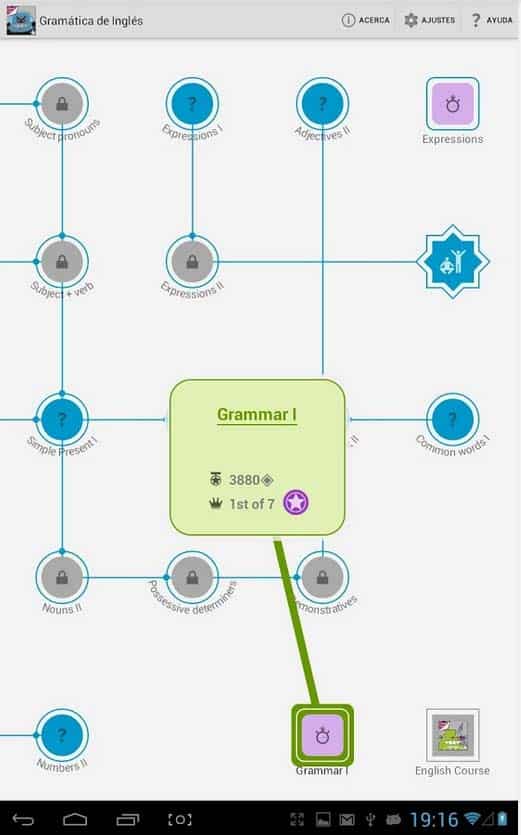 Gramática de Inglés
Gramática de InglésDestinada a los usuarios con niveles más básicos, muestra los conceptos de forma clara y comprensible. Tiene 44 lecciones y ejercicios que, además de gramática, también trabajan el vocabulario esencial. No necesita conexión a Internet para funcionar, es gratuita (para quitar los anuncios se puede optar por la versión Premium) y es compatible con Android.
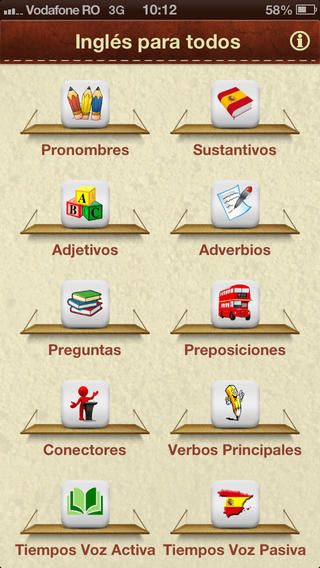 Inglés para todos
Inglés para todosHa sido pensada como una guía de consulta en la que encontrar respuesta a dudas sobre pronunciación, sustantivos, artículos, adjetivos, adverbios, verbos… Todas las explicaciones se complementan con ejemplos. Su precio es de 3,99 euros y es compatible con iOS.
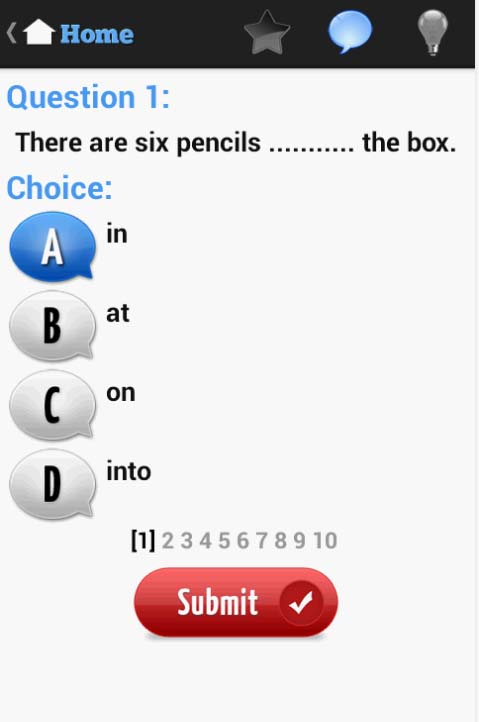 Inglés Gramática
Inglés GramáticaA modo de concurso, esta app gratuita para Android realiza pruebas con las que repasar todos los aspectos de la gramática inglesa. Se adapta a tres niveles: básico, intermedio y avanzado.
Apps para vocabulario en inglés
5 apps para aprender vocabulario en inglés
PONS Vocabulary Trainer
Su principal uso es servir de diccionario, pero PONS Vocabulary Trainer también incorpora la opción de ir recopilando todas esas palabras que vas buscando para que puedas recordarlas y afianzarlas. Es gratuita, está disponible en Android e iOS y basada en la versión web que puedes probar para hacerte una idea de lo que será la app.Vocab Genius
Vocab Genius es una app disponible en iOS y enfocada a un público más adulto que infantil, basada en flashcards con niveles que van añadiendo palabras cada vez más difíciles. Cada vez que avanzas se proporciona la definición de cada término, y en todo momento se va guardando un registro de las palabras que más te está costando aprender.Vocabador
miércoles, 29 de junio de 2016
viernes, 15 de abril de 2016
Trabajo práctico Inglés I - Primer cuatrimestre 2019 -Desarrollo
Inglés I, primer trabajo práctico
Rosendo, an
Island Man
A. Read the following
article and write possible headings to the paragraphs in Spanish
1 ______________________
Rosendo is 90 years-old. He is a
widower. He is tall, thin and white-haired. He is very healthy and active. He
has three grand-daughters, they love him a lot! He is one of my family’s best
friends.
2 _______________________
Although Rosendo’s house is in Moreno, he lives
in “Tigre”, on the Paraná de Las Palmas River because he is happy there. He
loves the river and nature! He goes to the city once a month to get his pension
and to see the doctor. He says: “I like modern facilities but I prefer sunrises
by the river. I don’t like the smog of the city.”
3. _______________________
His typical day is very interesting but tiring.
He gets up early in the morning, at six
o’clock in summer and winter! He does a lot of things: he cuts the
grass twice a month, he repairs his tools and he often paints his boat. Surprisingly, he can’t swim!
He prepares his “mate” and then he starts his
busy day. First, he feeds his dog, Toby. Secondly, he takes care of his
vegetable garden and orchard. When it doesn't rain, he prepares his fishing
line and he hopes to have a good catch.
At midday ,
he prepares lunch and he generally takes a short siesta. In the afternoon, he
relaxes and watches TV. He goes to bed early. On Saturdays, he waits for the
“grocer’s boat” to buy what he needs. At weekends, his family visits him and he
generally heats his clay oven to prepare the usual “asado”.
4. _______________________
He owns a big area. He eats vegetables from his
orchard: tomatoes, carrots, pumpkins and lettuce plants. He collects the fruit
from the trees, lemons, oranges, kumquats, and figs.
There are a lot of beautiful flowers in his
garden: hydrangeas, the typical island flowers, jasmines, magnolias and the
Argentine National Flower: the ceibo.
In winter, life is not easy on the island but
at least there are not any mosquitoes!
5. _______________________
He takes care of the environment and he is
worried about pollution and the quality of the river. He gets angry when someone throws rubbish in
the river! He is unhappy about the
planet. He says: “Now the river is in its worst condition.”
6. _______________________
Everybody loves him, he is noble, sincere and
friendly and he is always willing to help. You can always find some of his
friends in his house, garden or pier; they look for experience, good advice and
good company. He has endless stories about the island. He says: “I am crazy,
stubborn and not well-educated, but I always tell the truth, I respect
everybody and my friends can count on me”.
Answer the following questions in Spanish
What is
his name?
|
|
What does
he do?
|
|
What is he
like?
|
|
Where
does he live?
|
|
Is he a
good swimmer?
|
|
How often
does he paint his boat?
|
|
Are there
any mosquitoes in Tigre in winter?
|
|
Is he
worried about the river?
|
|
Which
flowers are there in his garden?
|
|
Do you
like nature?
|
Write in Spanish a summary of Rosendo’s daily
routine
Complete the following
table with examples of verbs in Simple Present Tense.
Example
|
Person
|
Base Form
|
Use (Spanish)
|
Write in Spanish the functions/uses of the
Simple Present Tense
Functions/Uses
|
Complete the table with examples from the text
(English)
Adjective
|
|
Adverb of
frequency
|
|
Connector
and use
|
|
Cognates
|
|
Common noun
|
|
Definite
article
|
|
False
cognate
|
|
Noun-noun
|
|
Personal
pronoun
|
|
Possessive
adjective
|
|
Possessive
case
|
|
Prefix
|
|
Proper noun
|
|
References
of time
|
|
Suffix
|
jueves, 25 de febrero de 2016
Trabajo práctico específico de la carrera
El trabajo específico de cualquier tema de la Carrera, debe
constar de un mínimo de 250 palabras para inglés I y 600 palabras para inglés
II.
Este trabajo hay que entregarlo en las últimas clases de la cursada.
Este trabajo hay que entregarlo en las últimas clases de la cursada.
Realizar un resumen o mapa conceptual en español y reconocer
estructuras gramaticales.
domingo, 31 de enero de 2016
Generalidades Inglés I
Primer cuatrimestre 2019 - Curso presencial: jueves de 13 a 17 horas- Aula 5 Ugarte - Departamento de Desarrollo
Importante: es posible que se abra un aula virtual para que tengamos de apoyo.
Importante: es posible que se abra un aula virtual para que tengamos de apoyo.
Les deseo mucha suerte en el curso, con esfuerzo y dedicación obtendremos excelentes resultados.
A continuación encontrarán algunos puntos esenciales en cuanto a la
materia.
ALUMNOS
Podrán cursar alumnos de todas las las Licenciaturas, Ciclos de
Licenciatura y Tecnicaturas con excepción de Turismo y Relaciones
Internacionales.
DURACIÓN
La cursada del nivel
representa una carga horaria de 70 horas reloj, distribuida en módulos
semanales de cuatro horas los días lunes, martes y miércoles.
CONDICIÓN DE
ALUMNO REGULAR
Para mantener la condición de
alumno regular es requisito cumplir con la regularidad establecida en el Reglamento
Académico, es decir, asistir a no menos de 75% de las clases,
podrá faltar a clases tres veces como máximo y aprobar los exámenes parciales o
los recuperatorios correspondientes y tener aprobado o regularizado el nivel
anterior, si correspondiese.
EVALUACIÓN
La evaluación será permanente
y tomará como indicadores los aportes realizados en los trabajos grupales y el
análisis de los trabajos individuales, el cumplimiento de pautas sobre la
presentación de los trabajos requeridos, la participación y el aporte durante
los encuentros y los exámenes parciales o sus recuperatorios.
Las evaluaciones parciales
serán escritas, presenciales e individuales. Consistirán en la realización de
un trabajo escrito centrado en la respuesta a un cuestionario sobre un texto,
la determinación de ideas básicas y secundarias del mismo y el relevamiento y
análisis de estructuras gramaticales aprendidas durante el curso.
Para promocionar la materia
El alumno deberá aprobar con
siete o más de siete las instancias de evaluación sumativas escritas para poder promocionar la materia. El
alumno que desapruebe —que obtenga nota menor a cuatro— tendrá derecho a
recuperar todas las instancias de evaluación pero no podrá promocionar. Los alumnos que
aprueben pero no promocionen —obtengan nota igual o superior a cuatro pero
inferior a siete— no tendrán derecho a promocionar.
Para aprobar la materia
En caso de no promocionar la
materia —si el alumno no aprueba alguno de los exámenes parciales con nota
siete pero obtiene una nota superior a cuatro— deberá rendir examen final
escrito. Este examen incluirá los temas vistos durante la cursada.
En caso de no aprobar la
materia o de tener alguna imposibilidad para cursarla, el alumno podrá rendir
examen final libre.
5.
MENORES
Por una cuestión de seguridad, no está permitido
concurrir a clase acompañados de menores.
6.
CALENDARIO
ACADÉMICO
Es conveniente guiarse siempre por el calendario académico disponible en
la página de la Universidad.
7. MATERIAL
Vamos a trabajar con el Cuadernillo de Inglés I del Departamento de Salud Comunitaria, 2015 disponible en fotocopiadora de la
UNLa. También podrán trabajar con el Cuadernillo de Estructuras gramaticales básicas 2015
Programa Inglés I
Universidad Nacional de Lanús
Dependencia
|
Secretaría Académica
|
Subdependencia
|
Dirección de Pedagogía
Universitaria
|
Área
|
Idiomas e Informática
|
Materia
|
Inglés 1
|
Departamento
|
Desarrollo Productivo y
Tecnológico
|
Modalidad
|
Presencial
|
Año
|
2019
|
Carga horaria
|
64 horas reloj
|
Docente
|
Trad. Pública Carolina
Strauch
|
1. Fundamentación
La planificación de esta asignatura forma parte del Plan de Estudios
de las carreras del Depto. de Desarrollo Productivo y Tecnológico de la Universidad Nacional
de Lanús.
El objetivo de este curso es examinar las estructuras
básicas del idioma Inglés, es decir, los aspectos gramaticales que sirven de
basamento para el conocimiento y uso de las principales formas de comunicación.
De esta forma, se pretende lograr la formación gradual de un lector hábil para
poder encarar la tarea de comprensión de manera independiente, pudiendo
analizar textos en idioma inglés, convirtiéndose así en un profesional actualizado,
permitiéndole acceder a la investigación en el área de su interés, mejorando su
calidad de trabajo y el propio desarrollo de la profesión.
Este idioma es una herramienta indiscutible para que un
profesional adquiera una competencia técnico científica interpretando en forma
precisa textos de su especialidad. Se pretende lograr dicho objetivo a través
de la comprensión lectora contando como herramienta, entre otras, la gramática,
a través de la cual, se reconocerán las funciones de las palabras para asignarles
el significado correcto.
2. Objetivos
Es preciso
que el estudiante sea capaz de:
·
Comprender el discurso escrito de su
especialidad.
·
Interpretar y retener la información esencial de
textos simples afines con la carrera elegida, por medio del análisis formal
(estructuras gramaticales y léxico) y funcional (cohesión interna y coherencia
lógica) de esos textos.
·
Aplicar a la lectura de estos textos procesos de
razonamiento (inferencia y deducción) y las habilidades ya adquiridas al leer
en su lengua materna.
·
Conocer el idioma dentro del marco del
vocabulario técnico.
Específicamente, será capaz de:
·
Resolver problemas lingüísticos, lexicales,
sintácticos y retóricos, en forma guiada, que le permitan desenvolverse como
lector independiente en los niveles más avanzados del curso.
·
Reconocer el tema central y las ideas
principales y secundarias de un texto, jerarquizando la información y asignando
a las ideas presentadas un orden lógico.
·
Sintetizar la información que extraigan de un
texto.
·
Utilizar adecuadamente diccionarios bilingües y
fuentes de investigación lo que les abrirá las puertas a la lectura y
comprensión de cualquier texto en la lengua extranjera.
·
Realizar búsquedas bibliográficas de todo tipo
(Internet, bibliotecas, etc.).
·
Redactar en su idioma informes, resúmenes y
diagramas basados en los textos.
3. Metodología
Los estudiantes leerán los textos correspondientes al material
didáctico y luego realizarán los ejercicios de comprensión lectora y
gramatical, respondiendo siempre en Idioma español a las actividades planteadas
por el docente. Se guiará a los estudiantes con los contenidos teóricos a
desarrollar junto con las consignas de elaboración para los trabajos prácticos.
El curso se desarrolla con una modalidad teórico-práctica.
- Desarrollo del área
teórica
Durante el transcurso de la clase teórica, los estudiantes
leerán los textos de comprensión general correspondientes al Cuadernillo Inglés
II. Trabajarán ejercicios de comprensión escrita (cuestionarios, determinar
verdadero o falso con justificación, multiple choice con justificación). Las
actividades que se propondrán a los participantes se desarrollarán en el grupo
total, en pequeños grupos o en forma individual, dependiendo esta organización
de los contenidos y estrategias seleccionada.
- Desarrollo del área
práctica
Durante el transcurso de esta etapa de la clase, el docente
presentará a los estudiantes un texto afín con la carrera. Se leerá este texto
buscando ejercitar en forma práctica el mismo aspecto teórico de los temas
gramaticales presentados en la clase general. En esta etapa, los estudiantes
emplearán los recursos disponibles para alcanzar la comprensión. Para ello, se resolverán actividades de
distintos grupos que luego discutirán con el docente afianzando la comprensión
del texto.
4. Modalidad
El curso será presencial.
En los cursos cuatrimestrales, la carga horaria es de 64 hs.
reloj distribuidas en un módulo semanal de 4 hs. reloj.
En el Curso Intensivo de Verano, la carga horaria es de 64
hs. reloj distribuidas en tres módulos semanales de 4 hs. reloj cada uno.
Para mantener la condición de regular, el estudiante debe:
- Cumplir con la regularidad
establecida en el Reglamento Académico. El estudiante puede faltar a tres clases
como máximo.
- Aprobar los exámenes parciales,
Trabajos Prácticos y/o los recuperatorios correspondientes.
5. Contenidos
Unidad 1
|
Reconocimiento de estructuras gramaticales. Artículos
definidos e indefinidos. Verbo “to be”. Adjetivos y pronombres demostrativos.
Plural de los sustantivos. Plurales de sustantivos de origen latino y griego.
Pronombres personales. Adjetivos
posesivos. El caso posesivo. Adjetivos: diferencias de la terminación “ed” e
“ing”. Cognados y falsos cognados.
Palabras clave. Principios de la comprensión lectora.
|
Unidad 2
|
Reconocimiento de sufijos y prefijos. Nexos coordinantes: but, and, so, etc.
Estructura sustantivo-sustantivo. Pronombres interrogativos: what, who,
where, how, what…like, how old, how much, how many. Presente simple de
verbos regulares e irregulares. Adverbios de frecuencia. Grado comparativo y
superlativo de los adjetivos. Modo imperativo.
|
Unidad 3
|
Reconocimiento del presente continuo. Adverbios de tiempo.
Uso del gerundio: como sustantivo, adjetivo, cláusulas adjetivas.
Reconocimiento de la voz activa y pasiva. Estructuras impersonales: uso del
“it”. Estructura de existencia. Verbos defectivos: can, must y may y sus
funciones de capacidad, habilidad, obligación y posibilidad. Presente
Continuo.
|
Unidad 4
|
Nexos coordinantes y subordinantes que indiquen causa,
efecto y consecuencia. Conectores. Futuro Simple. Reconocimiento de
condiciones (“if”).
|
6. Bibliografía obligatoria para el estudiante.
Material didáctico de Inglés 1. Cuadernillo de Inglés 1
Departamento de Desarrollo Productivo y Tecnológico.
Textos para la comprensión General.
Guía Gramatical.
7. Bibliografía de consulta para el estudiante.
El estudiante podrá consultar información adicional en las
siguientes páginas web:
En forma adicional, el estudiante podrá consultar
diccionarios, entre otros:
Diccionario Internacional Simon and Schuster, Inglés/Español
y Español/Inglés; Simon and Schuster, Inc. New York, NY 10023, ISBN 0-671-21507-8
Oxford
Advanced Learner’s Dictionary of Current English, A. S. Hornby, OUP
8. Evaluación.
Entendiendo a la evaluación como
el instrumento imprescindible a la
verificación del aprendizaje realizado por
el estudiante y a la obtención de informaciones por
parte del docente
para direccionar el proceso de
enseñanza-aprendizaje, se propone su realización a partir
de sus tres funciones: diagnóstica (para obtener informaciones acerca
de las capacidades del estudiante antes de iniciar el
proceso de enseñanza-aprendizaje), formativa (para que el estudiante descubra si
está alcanzando los objetivos propuestos
conociendo sus errores y aciertos y encontrando mayor estímulo
para un estudio sistemático
de los contenidos) y sumativa (para determinar
el grado de dominio del estudiante en
esta área y permitir
dar una
calificación que acredite el aprendizaje
realizado).
La evaluación formativa (oral y escrita ) se realizará a través de trabajos prácticos que el docente
presentará en las clases. Dichos trabajos serán trabajados en la clase , donde
se discutirán las dudas, y de ser necesario cuando el tema lo requiera se
trabajará sobre otros textos similares con la misma problemática hasta despejar
las dudas presentadas por los estudiantes.. Para incentivar
la responsabilidad del estudiante, se establecerán trabajos prácticos no obligatorios, haciéndolo responsable de su
propio desempeño en las instancias de evaluación parcial .
El sistema de evaluación utilizado será el de promoción,
entendiendo que en lenguas extranjeras no es necesario pasar obligatoriamente
por una instancia de evaluación final, ya que todas las evaluaciones tienen la
característica de integrar los conocimientos adquiridos.
- Para promocionar la
materia
El estudiante deberá aprobar con siete o más de siete las
instancias de evaluación sumativa escrita
para PROMOCIONAR la materia. El estudiante que
desapruebe —que obtenga nota menor a cuatro— tendrá derecho a recuperar
todas las instancias de evaluación. Los estudiantes que
aprueben pero no promocionen —obtengan nota igual o superior a cuatro pero
inferior a siete— no tendrán derecho a recuperar .
Ya que el curso tiene carácter teórico-práctico, se evaluará
también, a lo largo del ciclo lectivo, la realización de trabajos individuales
y/o grupales (orales y/o escritos).
- Para aprobar la materia
En caso de no
promocionar la materia —si el estudiante
no aprueba alguno de los exámenes parciales
con nota siete pero obtiene una nota superior a cuatro— deberá rendir examen final escrito . Este examen incluirá los temas
vistos durante
la cursada.
- Para rendir examen libre
En caso de no aprobar la materia o de tener alguna
imposibilidad para cursarla, el estudiante podrá rendir examen final libre.
Para ello, el estudiante deberá anotarse en el primer
llamado del turno SIN EXCEPCIÓN y rendir la instancia escrita sobre los
contenidos específicos y lingüísticos del nivel. Una vez aprobada la instancia
escrita, deberá rendir la instancia oral en el segundo llamado de acuerdo con
las pautas que están publicadas en el sitio web del Área de Idiomas e
Informática.
Con anterioridad al examen libre, se sugiere a los estudiantes
consultar al docente a cargo, quien le indicará pautas generales y modelos de examen
oportunamente.
Suscribirse a:
Entradas (Atom)



